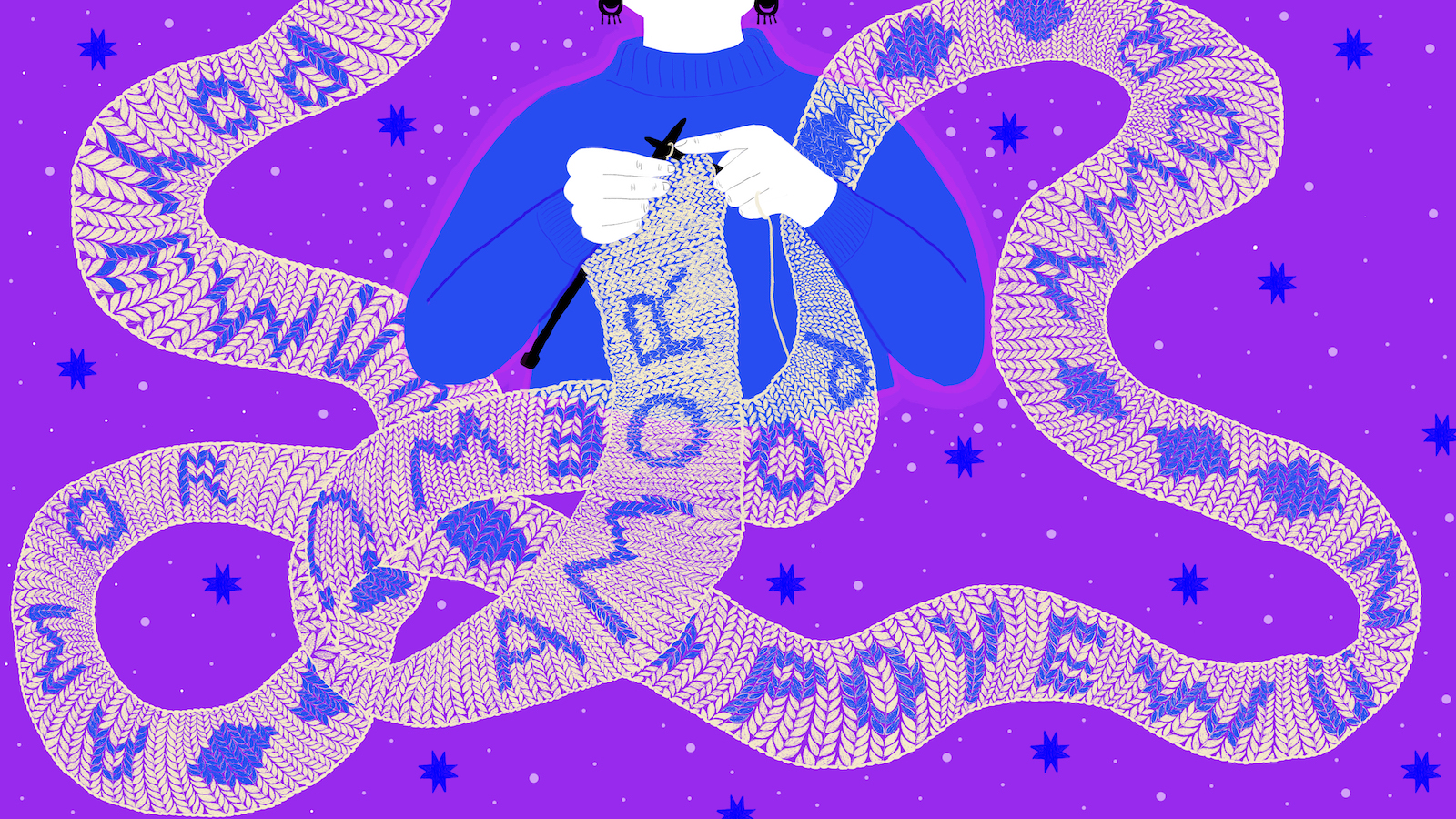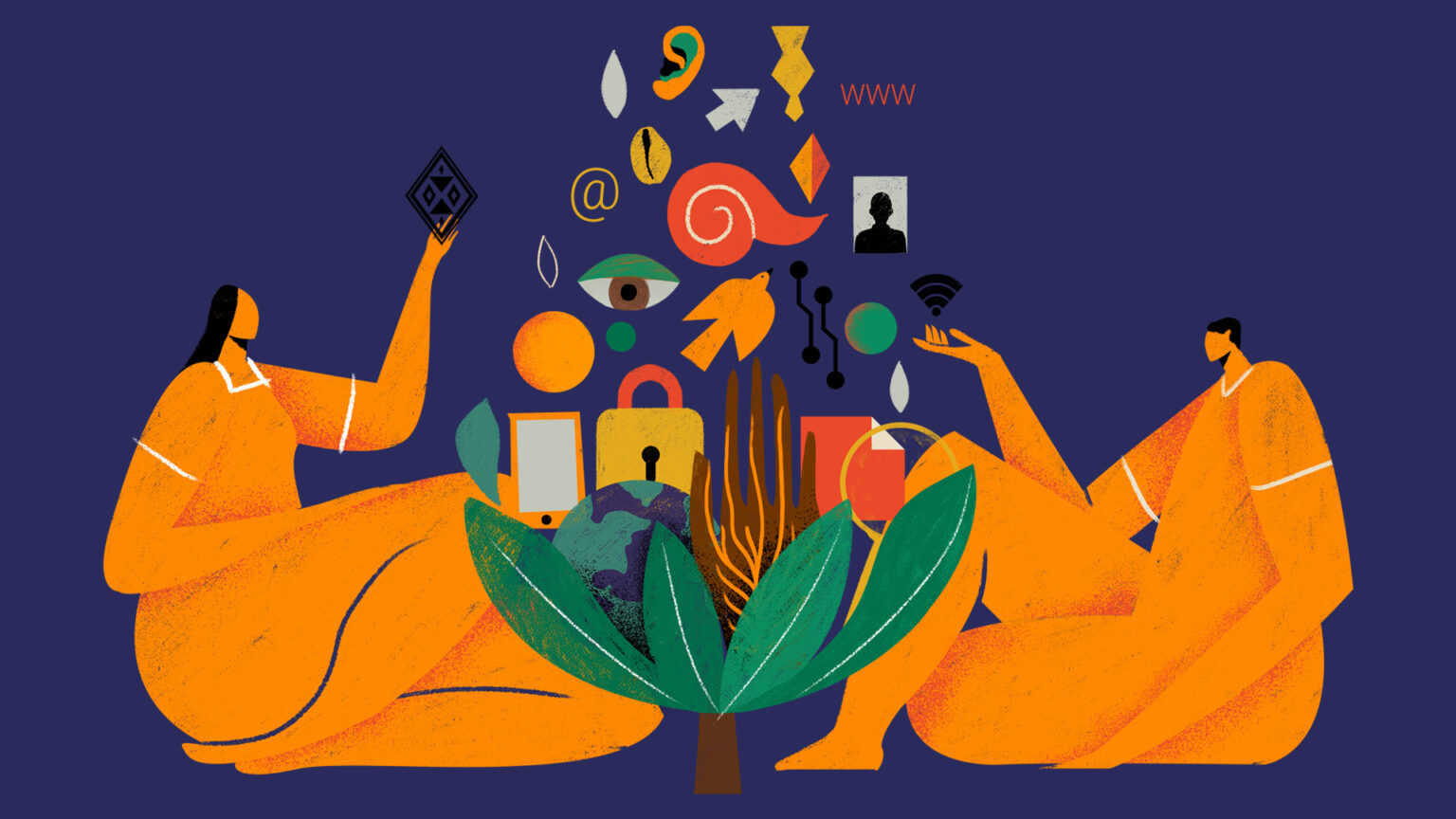
Illustration by Gianni Llanquiray Nahuelhual Tornini for Rising Voices
A version of this article will also be available soon in Mapundungun [1]
By Simona Mayo and María Alvarez, based on the case study “Poyewvn and Mapudungun as intercultural political practices: The case of the Mapuche language in the Constitutional Convention of Chile” by Simona Mayo
The drafting of a new Constitution in Chile in 2022 represented for the Mapuche people the possibility of envisioning a different relationship with the state, which has historically persisted in ignoring and extinguishing their existence. Elisa Loncon Antileo, a Mapuche woman, academic and linguist elected as president of the Constitutional Convention, also considered this process an opportunity to position Mapudungun in institutional spaces as a political act for poyewvn, or an act of love. Her strategy created various lessons and perspectives on how to promote and safeguard linguistic diversity that nowadays inspire new ways to think about strategies in other spaces, such as social media.
Loncon explained the concept of poyewvn during one of the sessions of the Constitutional Convention [2] as the Mapudungun word that refers to love, and as the possible basis for understanding and listening to each other. Talking about poyewvn was not only a political act for Mapudungun to occupy institutional spaces extending to digital spaces [3] that commonly favor Spanish; it was also a political act of positioning from the language, love and ternura, or tenderness, to face the violent and racist reactions that were amplified along with her voice and her speech.
I call the members of the Convention to speak from poyewvn, love. We are human beings, we have equal rights and with that love we will accept that we are different. Because there are different identities in every house.
Despite the subsequent rejection of the new Chilean Constitution through the plebiscite on September 4, 2022, the presence of Elisa and her cabinet at the Constitutional Convention of Chile marked the beginning of a new era in the history of the country and its relationship with the Mapuche people and their language. It also made evident the structural racism within the Chilean society that privileges Spanish and Western language, culture, and political organization over any other. To better understand Elisa’s relevance and courage as a Mapuche woman leading the drafting of a new constitution, positioning her language in institutional and digital spaces, it is important to look at her role in the broader context of Chile and the persistent struggle of the Mapuche people for their linguistic rights.
Envisioning a “monolingual” Chile
Like most Latin American countries with a history of colonization, Chile is a country that has established itself as a nation in a monocultural, monolingual tradition with a colonial imprint on the pre-existing native peoples. In the 19th century, this strategy involved the implementation of a Spanish-centered educational system whose objective was “civilizing” the Indigenous population and which, through its public policies, advanced the homogenization and assimilation of Indigenous people. Despite their systematic territorial, social, cultural and linguistic dispossession, currently in Chile there are six languages besides Spanish: Aymara, Quechua, Rapa Nui, Kawésqar, Yagan, Mapudungun, and Ckunza — which some have considered as extinct is now currently undergoing a process of revitalization.
Given the persistent position of the Chilean state in recognizing itself as monolingual, the Indigenous movements in Chile and their various organizations have focused on working for the revitalization, maintenance and dissemination of their languages, particularly in the last two decades. In 2010, the Network for the Educational and Linguistic Rights of the Indigenous Peoples of Chile began working on the draft Law for the Linguistic Rights of Indigenous Peoples [4] with the aim of achieving a constitutional legal framework for the recognition of the languages and rights of these speakers. Although there has been no progress in the formal and legal recognition of linguistic diversity, the organizations have continued their work from different spaces to maintain and continue the transmission of languages to the new generations.
Diversity and the constitutional process
The popular revolt on October 18, 2019 and the recent constitutional process brought the recognition of Indigenous peoples and their rights back into the debate. Moreover, cultural and linguistic rights came at the forefront of constitutional discussions, which was unprecedented in the history of Chile. The mobilization taking place in the last two years represented the expression of a society discontented with the political institutions in Chile and a reflection of the deep social crisis that was a result of the neoliberal system installed during the military dictatorship of 1973–1989.
There are two main strategies that emerged from the social outbreak: on one hand, the popular movements in the streets and from organizations outside any hegemonic political institutionality; and on the other hand, the dialogue between the state, the political parties and the various organizations of the social movements of civil society that converged in the implementation of the Constitutional Convention of Chile. In this second strategy, through debates and proposals held between July 2021 and July 2022, the convention had as its main objective the drafting of a proposal for a new constitution to replace the one imposed by the military dictatorship of Augusto Pinochet.
In this context, the convention began with the election of Loncon as president: a Mapuche woman, academic and activist for the revitalization of native languages, in a traditionally patriarchal space and rooted in the denial of pre-existing peoples by the state. With the opportunities that opened up with her appointment and the strength of her presence, Elisa started leading the entity that will rewrite the political Constitution of Chile with a speech in Mapudungun. From that moment on, she and her cabinet included words from the Mapuche language, which in turn created changes in the relationships that were established in the process, such as calling lamgen (or sisters) both Mapuche persons and Winka (non-Mapuche, in Mapudungun). As Marta Yáñez Queupumil, one of the legal advisors in Elisa’s cabinet, points out:
The use of Mapudungun was revolutionary because the fifth of July editions of the newspapers included on the front pages the greeting in Mapudungun “mari mari kom pu che” (hello to all the people). After being elected president, Elisa came out, smiling, with a Mapuche flag outstretched. The use of Indigenous languages or the fact that Elisa’s first speech as president was delivered in Mapudungun allowed us to open a door for historical and cultural change in Chile.
As Rayen Cariman, a member of the cabinet, stated in an interview, “it was very nice to see that the language occupied a place that it always should have occupied, as a language, as an instrument of communication and not as a museum piece”. In this sense, what can be understood as a lesson of poyewvn, through the use of Mapudungun, fulfilled the materialization of diversity and interculturality beyond political discourses.
Online violence
Thus, while cultural diversity in Chile became visible with Elisa at the forefront of the constitutional process, the latent racist and discriminatory perceptions and attitudes in society, the media and social networks regarding Indigenous peoples were also evident. A very clear example was represented by the declarations of the constituent Teresa Marinovic [5], who on Twitter accused the machi (Mapuche traditional and spiritual authority) Francisca Linconao, of “not missing the opportunity to put on a show” during her speech in an institutional space using her mother tongue, Mapudungun. These types of statements show how Indigenous languages can be accepted only as something exotic, when they do not affect or criticize the hegemonic structures. However, when they begin to position themselves and identify themselves from spaces of power, from their fundamental rights and from political activities, they make those who have always occupied those spaces uncomfortable.
The use of Mapudungun as a political and poyewvn act implies a series of risks, both in institutional and public spaces, and on social networks that replicate the same hegemonic and monolingual norms, also translated into digital violence. First, there is a risk related to linguistic and cultural rights: to the extent that the use of the language and its presence in spaces of power was questioned by various sectors in highly interactive social networks, violating the fundamental rights of the speakers who chose to express themselves and exist from the language that is more meaningful for their identity.
A second risk was, and still is, the potential materialization of digital violence. The Twitter social network was the most used to harass and threaten the members of the Convention who are Mapudungun speakers, like Loncon, even going so far as to publish sensitive personal information such as her residential address. The most serious threats against the cabinet were those received and expressed on the Twitter account of the Constituent Assembly. Referring to this situation, Loncon comments in an interview: “We can all unite in our diversity, but respecting each other and not homogenizing ourselves. A homogenizing Chile is very damaging because it does not accept that we can be different.”
Loncon’s speeches reaffirmed that languages are not accessories and ornaments, but epistemic elements that provide the speakers with spiritual, cultural, political and philosophical content. They also revealed that there is a lack of digital strategies that protect the dignity and integrity of speakers like Elisa who make social networks a political space to position languages that have historically been discriminated against.
From these findings, a series of recommendations result that we see as ways to make the Internet a space to interact from the poyewvn, while promoting the presence of linguistic diversity and the use of digital tools for the activism and revitalization already existing in Chile:
- Design and implement an awareness process regarding the use of the language in both institutional and digital spaces. Include strategies to disseminate the rights of native language speakers that target the sectors that see them as a threat and that respond to it with expressions of hate and violence in the media and digital platforms.
- Design digital tools and strategies conceived from and for the experiences of language activists.
The participation of Loncon and her cabinet in the process of the Constitutional Convention in Chile marks a new era in the historical relationship of the State with Indigenous peoples, but also with society in general. Although it highlighted the systemic racism by which the existence of the peoples in the country has been made invisible, it also allowed for spaces coming from the language, dialogue and memory of the Mapudungun. These spaces were a reminder of the strength of Wallmapu (the ancestral territory of the Mapuche people) and its willingness to dialogue from the diversity of languages and territories that coexist (and pre-exist) in what is now known as Chile.
How to imagine, from these learnings, safe and diverse digital spaces? How to promote the use of the language along with the safety of those who speak it? The convention’s strategy of recognizing poyewvn as an intercultural political practice for the relationship between peoples in institutional and digital spaces, can be a starting point to continue positioning linguistic diversity on the internet.
